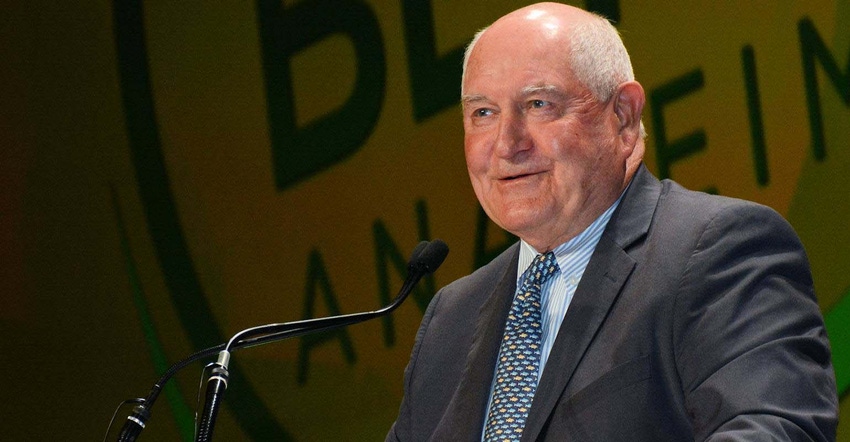New cotton ginning cost-share program launched to offer safety net until changes are made for 2018 cotton crop year.

Secretary of Agriculture Sonny Perdue announced at the 66th Annual Mid-South Farm & Gin Show over the weekend that the U.S. Department of Agriculture is taking action to assist cotton producers through a Cotton Ginning Cost Share (CGCS) program in order to expand and maintain the domestic marketing of cotton.
“America�’s cotton producers have now faced four years of financial stress, just like the rest of our major commodities, but with a weaker safety net,” Perdue said. “In particular, cotton producers confront high input and infrastructure costs, which leaves them more financially leveraged than most of their colleagues. That economic burden has been felt by the entire cotton market, including the gins, cooperatives, marketers, cottonseed crushers and the rural communities that depend upon their success.”
National Cotton Council chairman Ron Craft commended Perdue for his efforts. Craft, a Texas cotton ginner and producer, said this program will provide direct marketing assistance to producers and will help alleviate some of the economic conditions with which producers are struggling. This program, based on the 2016 cotton crop will help to fill the safety net void until the seed cotton Agriculture Risk Coverage/Price Loss Coverage program is implemented beginning with the 2018 crop year.
American Cotton Producers chairman Shawn Holladay of Texas added, “Our producers across the Cotton Belt are sincerely grateful for Secretary Perdue's commitment to provide marketing assistance to a commodity that is struggling due to heavily subsidized foreign fiber competition and the immediate lack of a safety net policy on par with other crops. The industry will continue to work with USDA and Congress to implement the long-term policy solutions recently enacted by Congress that will provide stability for the cotton industry going forward.”
The signup period for the CGCS program runs from March 12 to May 11, 2018.
Perdue said, “I hope this will be a needed help as the rural cotton-growing communities stretching from the southeastern U.S. to the San Joaquin Valley of California prepare to plant. This infusion gives them one last opportunity for assistance until their farm bill safety net becomes effective.”
Under the program, which is administered by the Farm Service Agency (FSA), cotton producers may receive a cost-share payment, which is based on 2016 cotton acres a producer reports to FSA multiplied by 20% of the average ginning cost for each production region.
Regional per-acre payment rates are set at 20% of USDA’s regional costs of ginning and are as follows: Southeast (Alabama, Florida, Georgia, North Carolina, South Caroline and Virginia), $23.21; mid-South (Arkansas, Illinois, Kentucky, Louisiana, Missouri, Mississippi and Tennessee), $30.39; Southwest (Kansas, Oklahoma and Texas), $19.65, and West (Arizona, California and New Mexico), $48.02.
Cost-share payments are capped at $40,000 per individual or entity and do not count against the 2014 farm bill payment limitations.
To be eligible for a CGCS program payment, each applicant is required to be a person or legal entity who was actively engaged in farming in 2016 and who complies with requirements that include, but are not limited to, those pertaining to highly erodible land conservation and wetland conservation provisions, commonly referred to as the conservation compliance provisions. A producer’s three-year average adjusted gross income may not exceed $900,000 to be eligible for the cost-share payments.
About the Author(s)
You May Also Like



.png?width=300&auto=webp&quality=80&disable=upscale)

